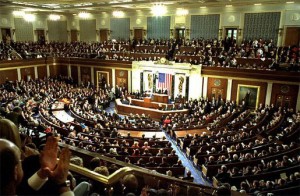Political junkies eagerly await President Obama’s State of the Union address, but advance reports indicate it will be more of the same “solutions”: throwing more 
Scoop on the SOTU
A recent WSJ piece summarizes the details of the president’s likely message:
President Barack Obama will call for new government spending on infrastructure, education and research in his State of the Union address Tuesday, sharpening his response to Republicans in Congress who are demanding deep budget cuts, people familiar with the speech said.
Mr. Obama will argue that the U.S., even while trying to reduce its budget deficit, must make targeted investments to foster job growth and boost U.S. competitiveness in the world economy. The new spending could include initiatives aimed at building the renewable-energy sector—which received billions of dollars in stimulus funding—and rebuilding roads to improve transportation…
While proposing new spending, Mr. Obama also will lay out significant budget cuts elsewhere….”We seek to do everything we can to spur hiring and ensure our nation can compete with anybody on the planet,” Mr. Obama said Friday after touring a General Electric Co. plant in Schenectady, N.Y. He cited clean-energy manufacturing, infrastructure and education as keys to competitiveness.
Previewing the expected theme of his speech, Mr. Obama on Friday appointed GE Chief Executive Jeffrey Immelt to lead a new President’s Council on Jobs and Competitiveness.
How to Achieve “Competitiveness”
If the federal government really wants to help American businesses compete with their foreign rivals, it should stop shackling them with high corporate tax rates and unnecessary regulations. But to understand the proper and improper ways to boost competitiveness, we need to understand how trade affects economies.
Economists have argued for more than two centuries that people in all countries benefit from open trade. If each country specializes in its “comparative advantage,” total world output is maximized allowing for the highest per capita income. American workers can’t produce everything that American consumers buy, because then we wouldn’t benefit from the division of labor and the ability to trade with other people around the world.
If a foreign factory can “out-compete” American producers because of low wages, that’s a reflection of American prosperity: Our workers don’t need to take jobs paying a dollar a day, because their labor is so much more productive than in many poor countries. It is an unfortunate reality that billions of people scattered across the globe have much lower productivity than the average American worker. The only way they can participate in the global economy is by accepting low wages in order to charge low prices for their exports. To repeat, the fact that American firms “can’t compete” in every single industry on Earth isn’t a bad thing—it’s how the market economy arranges production, and assigns high-productivity American workers to the tasks that are most suitable for their skills.
Of course, we don’t live in a global, free-market utopia. All governments—including our own—interfere with trade, some more than others. But the case for freeing up trade is unilateral: Regardless of what other governments are doing, the U.S. government only makes Americans poorer (on average) when it restricts their choices and tries to pick winners and losers.
If Clean Energy Is So Competitive, It Doesn’t Need Federal Support
In the case of President Obama’s likely remarks, the economy doesn’t need the federal government subsidizing “clean energy” manufacturing and other pet political projects. It’s true, the recipient of a federal handout can afford to lower prices and thereby boost “competitiveness.” But that comes at the expense of the rising taxes and debt payments levied on all the other companies who have to pay for the handout.
President Obama isn’t the Tooth Fairy. Any money his administration gives to “green” companies or spends on infrastructure, comes either from tax revenues or from issuing more government debt. His proposals will make some industries more competitive while making others less competitive. And the way politics works, the companies receiving the support will of course be the ones that currently can’t compete in the global marketplace—that’s why they need the handouts in the first place.
Déjà vu All Over Again
Our critical analysis isn’t mere theory; we know from experience—both in the U.S. and abroad—that the federal government can’t overturn economic reality through spending. Renewables like wind and solar have been subsidized for the last 30 years and yet today those two sources produce less than 1 percent of total energy use.[i] Possibly worse, after more than 30 years of subsidies, they still claim they need massive subsidies and mandates to compete. What is standing in the way of wind and solar “competitiveness” is that they are expensive and unreliable forms of energy and happy talk in the State of the Union isn’t going to change that reality. Furthermore, international experience in Spain, Denmark, and Germany shows that massive subsidies for wind and solar do not create jobs. In fact, the Spanish study showed that it these subsidies cost 2.2 jobs per job created as an opportunity cost.
Conclusion
American firms can compete in the global marketplace, despite much lower wages in some parts of the world, because American labor is very productive. If President Obama and others in Washington want to boost competitiveness, they can lower tax rates across the board, reduce unnecessary red tape, cut spending (to return more resources to the private sector), and remove restrictions on the development of domestic energy sources. They don’t need to single out particular sectors for federal handouts, because that money comes from somewhere.
By trying to make his favored industries more competitive, President Obama will simply make every other industry less competitive. Government officials do not have a crystal ball, and can’t allocate funds more wisely than investors with their own money on the line. To boost American competitiveness in the 21st century, the federal government needs to get out of the way.
[i] See Table 1.3, page 7, of the EIA’s December 2010 Monthly Energy Review [.pdf].